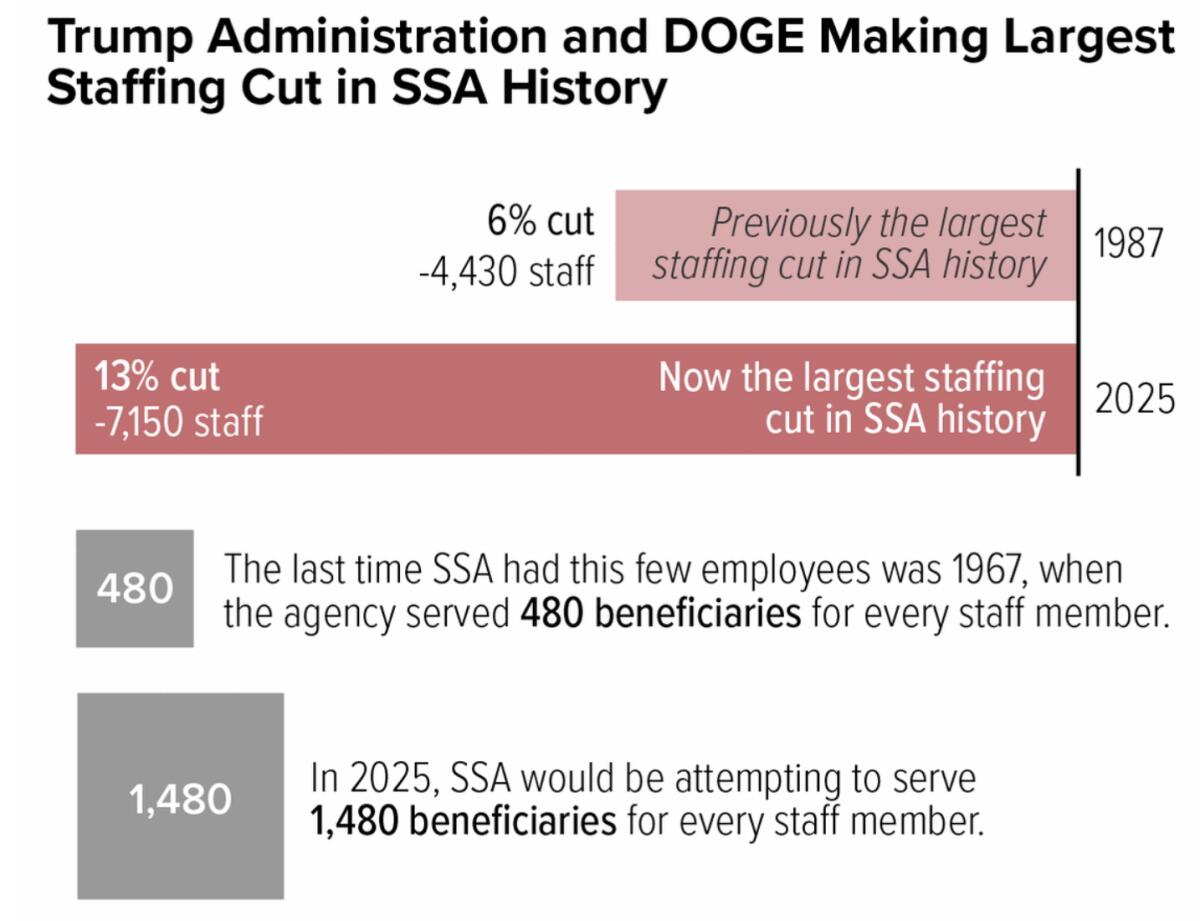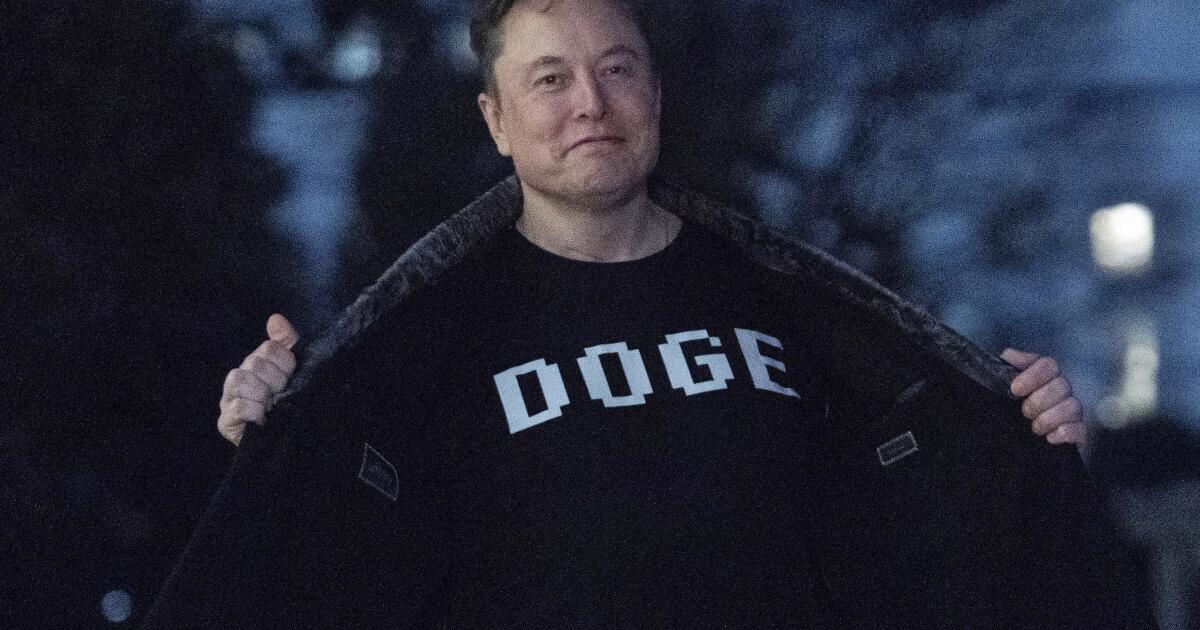Hiltzik: Social Security’s ability to serve you is crumbling
There’s some good news related to the Trump administration’s concerted attack on the Social Security Administration: Thus far, it doesn’t appear to have significantly affected the delivery of benefits. Checks are still going out and payments into beneficiaries’ bank accounts are still arriving on time.
Beyond that, however, the system is going to hell.
While Social Security appears to still be working well — superficially — under the surface the agency is suffering through a period of unprecedented turmoil. That’s the gist of a new report by Kathleen Romig and Devin O’Connor, Social Security experts at the Center on Budget and Policy Priorities.
Serious data security lapses, evidently orchestrated by DOGE officials, currently employed as SSA employees,…risk the security of over 300 million Americans’ Social Security data.
— Social Security whistleblower Chuck Borges
Under the Trump administration, Romig and O’Connor observe, the Social Security Administration’s regional office staff “have been mostly eliminated, robbing front-line staff of key supports.” Headquarters staffing has been cut by nearly half, including technology experts. Field office and call center staff also have been eviscerated.
Few departments within SSA have been spared — not even the office tasked with helping members of Congress assist their constituents with Social Security issues and helping to develop legislation.
Newsletter
Get the latest from Michael Hiltzik
Commentary on economics and more from a Pulitzer Prize winner.
You may occasionally receive promotional content from the Los Angeles Times.
The so-called Office of Legislation and Congressional Affairs was cut to three employees from 50. Constituent caseworkers in congressional offices have been receiving “bounce-back emails and no-replies from legislative liaison offices that were previously responsive to congressional inquiries,” according to a letter sent by 50 Democratic House members to the SSA in July.
Even Republicans, who generally have been willing to go along with the administration’s rampage through agency budgets, raised the alarm about customer service failures at SSA, noting in a legislative markup that “there are significant service delivery challenges at SSA that are impacting critical services that millions of Americans count on. “
The agency’s staffing problems may be simmering under the surface, but it translates into chronically poor customer service. “Inadequate staffing at SSA directly harms the retirees, people with disabilities, and bereaved families the agency is responsible for serving,” Romig and O’Connor report.
“Because there aren’t enough workers in SSA’s local offices, applicants wait over a month on average for an appointment. Because there aren’t enough people answering the agency’s 800 number, most callers wait over two hours on average for an answer, as of early August,” they write. “Because there aren’t enough disability examiners, applicants wait eight months for an initial decision on their eligibility for disability benefits, with an additional seven-month wait for those who appeal.”
Meanwhile, more information has emerged about the incursion of untrained representatives of Elon Musk’s budget-cutting DOGE service into Social Security’s most carefully guarded databases. The outcome has been the exposure of workers’ and beneficiaries’ private personal information to outsiders, all without adequate oversight.
I’ve been following Trump’s campaign against Social Security from the outset. Although Trump has promised repeatedly that “we’re not touching Social Security,” actions speak louder than words, and his unconcern about the program, if not his outright hostility, have been screaming from the rooftops.
Among the weapons Trump could use to undermine the program, as I wrote, was “starving the program of administrative resources — think money and staff.” As it happened, Sure enough, within a month of Trump’s inauguration, the program announced plans to reduce its employee base to 50,000 from 57,000.
Its press release about the reduction referred to the program’s “bloated workforce.” That sounded like a cheap gag, since the truth is that the agency has been hopelessly understaffed for years.
The DOGE team showed its ignorance and incompetence at every turn, issuing inaccurate assertions about fraud at Social Security and then instituting operational changes that had no effect on fraud but inconvenienced thousands of beneficiaries. In March, for example, a DOGE employee went on Fox News with the claim that 40% of phone calls to the agency to change direct deposit information came from fraudsters. As a result, the agency mandated that such changes had to be made in person or online.
The true statistic misinterpreted by DOGE was that 40% of direct deposit fraud is connected with phone calls, not that 40% of all calls to change bank information is fraudulent. After the dime dropped at DOGE, the restriction was rescinded.
Since then, the Trump administration has acted from time to time as if the Social Security Administration is an arm of the White House. In March, it shut down SSA services in Maine because the state’s governor had challenged Trump face-to-face over his policies. (The decision was promptly reversed, but then-Acting Commissioner Leland Dudek admitted that he had taken the step in retaliation for the governor’s conflict with Trump.)
In April, Trump tried to dragoon Social Security into his anti-immigrant campaign by declaring some 6,300 purportedly illegal immigrants to be “dead” in program records, even though they were very much alive. The administration said its goal was to deny the workers benefits, though under the law noncitizens without legal residency in the U.S. can’t collect benefits, even if they’ve made payroll contributions to the program.
The biggest threat to the public’s confidence in Social Security may be the administration’s raid on its secure databases, starting with a rampage by DOGE documented by then-Chief of Staff Tiffany Flick.
More has come out since Flick filed her account in court. Last month, Chuck Borges, formerly the program’s chief data officer, filed a whistleblower affidavit outlining his concerns about “serious data security lapses, evidently orchestrated by DOGE officials, currently employed as SSA employees, that risk the security of over 300 million Americans’ Social Security data.”
DOGE, Borges reported, created “a live copy of the country’s Social Security information” and placed it in a digital platform that could be easily accessed by those without authorization.
At issue is the so-called NUMIDENT database, which includes the “name, … place and date of birth, citizenship, race and ethnicity, parents’ names and social security numbers, phone number, address, and other personal information” of every applicant for a Social Security card.
“Should bad actors gain access to this cloud environment,” Borges asserts, “Americans may be susceptible to widespread identity theft, may lose vital healthcare and food benefits, and the government may be responsible for re-issuing every American a new Social Security Number at great cost.”
Trump has instituted the largest staffing cut in Social Security history, while the caseload per employee is higher than ever
(Center on Budget and Policy Priorities)
A federal court shut that access and activity down. But in June it was overruled by the Supreme Court, which unaccountably granted DOGE members access to the agency database “in order for those members to do their work.”
SSA didn’t respond to my request for comment on these issues or on increasing concern about the program’s functioning under its recently installed commissioner, Frank Bisignano.
Bisignano has been issuing self-congratulatory press releases boasting about improvements to customer service metrics at the agency — for example, phone answer times cut to an average of six minutes, down from 30 minutes last year. A press release issued in July attributed the improvement to “focused technology enhancements and process engineering.”
In fact, according to Romig and O’Connor, it’s more likely that the improvement happened because the agency reassigned 1,000 staffers from field offices, where they served clients face-to-face, to answering phones. The reassignments, Romig and O’Connor observed, “likely is coming at a steep cost to the rest of the agency’s work.”
At least 2,000 field office employees already had been pushed out by DOGE, so removing an additional 1,000 workers from the field only “deepens problems for people seeking in-person service — which were already considerable.”
Indeed, back in April the agency itself acknowledged that more than three dozen field offices around the country were in dire condition, suffering staff losses of 25% to 33% from DOGE’s “voluntary” resignation program that resulted in the loss of more than 7,000 workers overall, or 13% of the payroll.
Earlier this year, DOGE listed 47 Social Security offices due for closing, though it is not clear how many have actually been shuttered this year or what the schedule is for closing the rest.
Over the last decade or so, Lawmakers on Capitol Hill have been wringing their hands over what they say is Social Security’s impending fiscal crisis, caused by the exhaustion of its trust fund reserve sometime in the next decade. But that’s still the subject of conjecture.
What’s more certain is that the congressional cheeseparing and the DOGE raid that have produced the largest staffing cut in the program’s history — at a time when its caseload is at record size and is destined to grow even further — loom as a greater threat to most workers and beneficiaries.
“To raise customer service to acceptable levels, Congress must not only provide SSA with sufficient funding but also forcefully push back against the Administration’s current mismanagement of its existing resources,” Romig and O’Connor maintain.
They’re right. Isn’t it time for Capitol Hill to take firm, bipartisan action to protect America’s most important government service from its enemies?

